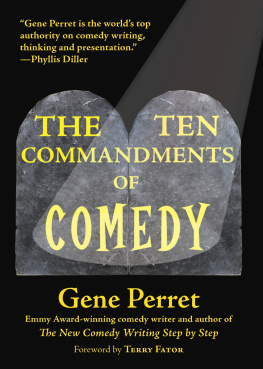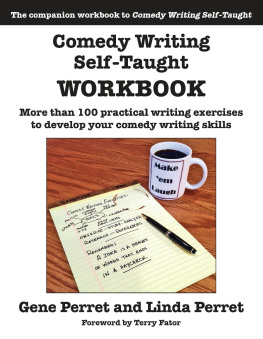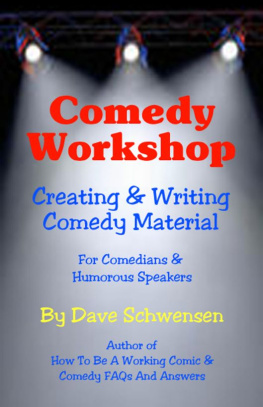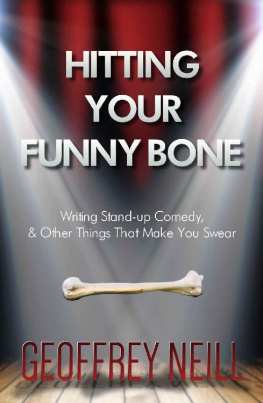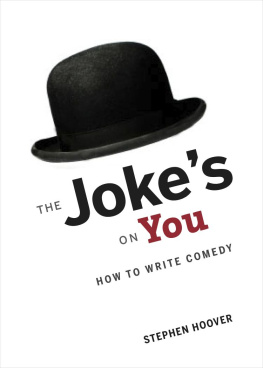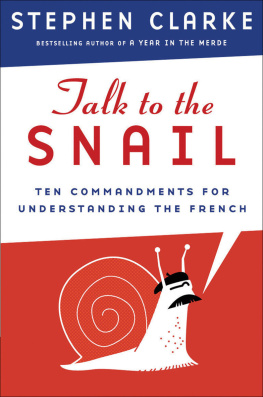The Ten Commandments of Comedy
Copyright 2013 by Gene Perret. All rights reserved.
Moses image courtesy Gene Perret.
To the guy whose jokes Ive been stealing for years,
my brother, Fran
Published by Quill Driver Books
An imprint of Linden Publishing
2006 South Mary Street, Fresno, California 93721
(559) 233-6633 / (800) 345-4447
QuillDriverBooks.com
Quill Driver Books and Colophon are trademarks of Linden Publishing, Inc.
ISBN 978-1-61035-153-9
135798642
Printed in the United States of America on acid-free paper.
Library of Congress Cataloging-in-Publication Data
Perret, Gene.
The ten commandments of comedy / by Gene Perret.
pages cm
Includes bibliographical references.
ISBN 978-1-61035-125-6 (hardcover : alk. paper)
1. Wit and humor--Authorship. 2. Comedy--Authorship. I. Title.
PN6149.A88.P48 2013
808.7--dc23
2012041698
CONTENTS
FOREWORD
N ot long after I started doing ventriloquism, I wrote my first comedy bit; it was a little routine with my new puppet and I performed it for my family. After I finished my father told me that my patter was terrible and that I just couldnt write comedy so I should stick to routine books and not try to write my own material. I was 10 years old. This proves once and for all that comedy does, indeed, come from pain.
Despite that setback, I persevered and went out and performed through my teenage years and through college. Ill never forget a time in my early 20sI was in the middle of a show when there was a sudden, loud noise in the back of the room, surprising everyone. I tried to ad lib, but failed to get a laugh. Nothing. Nada. Crickets. I believe the Yiddish word is bubkes. It just brought back what my father had told meI wasnt funny on my own so I shouldnt even try.
Now the good part. In my mid-20s my luck changed dramatically when I stumbled on a little book in my local library written by Gene Perret called Comedy Writing Step by Step (since updated to The New Comedy Writing Step by Step). I checked it out and devoured it eagerly, trying to find out if I had the knack to write my own material. I read and reread it from cover to cover, taking each step very seriously, working on every exercise Gene recommended.
I clearly remember the first joke I ever wrote while working through one of Genes comedy writing exercises. I wanted to write jokes about marriage for my puppet, Walter T. Airdale. The joke went like this:
TERRY: So Walter, I understand your anniversary was last week.
WALTER: Yep, it sure was. It was our iron anniversary.
TERRY: Which anniversary is that?
WALTER: I forgot our anniversary and she hit me with an iron!
Not a great joke, but it was life-changing for me. With that one joke I realized that I had the ability to write my own material! I kept at it; I would use Genes book as my comedy bible and do the exercises constantly. As a result, two things happened. The jokes started to flow faster and faster, while the enormous emotional brakes my father had put me under began to disappear. I could write a funny joke!
A few years and much hard work later that joke-writing confidence and ability enabled me to ad-lib as well, always getting a laugh when the unexpected happened during my show. And it all came from my hard work and dedication to the principles Gene had laid down in his books.
Genes new book, The Ten Commandments of Comedy, ties together all the lessons I learned from his past books and workshops. Its an amazing tool that contains the main rules of comedy for anyone who wants to make a career as a comedy writer, performer, public speaker, or even for someone who just wants to be funnier in living rooms. Regardless of which describes who you are, you should read and review this book regularly.
I am living proof that these rules and principles work, because decades after that fateful day when I discovered and read that book by Gene Perret, I won Americas Got Talent and now am the headliner in my own theater at the Mirage in Las Vegas.
Thanks, Gene! I hope this in some small way lets you know how much your teachings changed my life. And for all of you who are starting to fulfill you own dream by reading The Ten Commandments of Comedygood luck! You are Luke Skywalker about to be taught by the Jedi master Yoda of comedy writing: Gene Perret.
Terry Fator
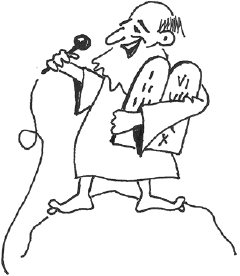
INTRODUCTION
A nything that works does so because it follows those principles that make it work. An airplane flies because it is built according to the principles that govern flight. A clock keeps accurate time because its manufactured to follow the rules that govern timekeeping. The lights go on when you hit the wall switch in your home because theyre wired in accordance with laws governing electricity. If these items didnt follow the rules, they wouldnt work.
There are fundamentals, too, that apply to comedyrules that must be followed. Some may object that comedy should be free-flowing, improvisational, creative. I dont want to follow rules, they might say. I just want to do what I want to do to make people laugh. Following some set of regulations would inhibit my originality. Its a faulty argument. Would you want to fly to Pittsburgh in a plane that was built by someone who said, I dont want to follow rules. I just want to build airplanes the way I want to build them? Probably not. Its almost certain that youd rather fly in one that gets off the ground and stays off it for as long as the pilot wants.
Does adhering to established principles inhibit originality? There are countless types and models of airplanes: single-engine aircraft, giant passenger planes, stealth bombers, huge cargo transports, and hundreds of other variations. Despite their differences, they all fly because they follow the principles of flight. Theres no foreseeable limit to the inventiveness of aeronautical engineers and the machines they will create, yet you can be certain the remarkable aircraft of the future will still follow the principles of flight.
Again, though, some may argue that these examplesairplanes, clocks, and lightsare mechanical. Mechanical items are obliged to follow physical principles. Creative artists, though, should be free of such restrictions. For artists to follow rules, these people might claim, would be to limit their creativity, their genius.
Music, though, is a creative art. There are brilliant classical composers, great song writers, and innovative musicians who work in jazz, rhythm and blues, heavy metal, and so on. Yet all of them are governed by strict, mathematical principles. Scales are well defined. Chords that harmonize with the melody are controlled. Play according to those rules and you can create beautiful music in whichever genre you prefer. Break those rules and the music sounds discordant.
Knowing the principles of music frees rather than inhibits the musician. Many people can pick up a guitar and readily play hundreds of songs by learning just three, maybe four, basic chords. By studying the principles that govern music, though, a musician can then add depth, variation, and charm to the music. If Beethoven had been limited to using three or four basic chords, he might have played some cute ditties for his friends to sing along with at dinner parties, but he could never have written his symphonies and would never have become a musical legend.
The more you know about your craft, the better you can master it... and the more enjoyment you can bring to yourself and to others.
A key benefit of knowing the principles of your craft is that it allows you to search back and find flaws in your work. It also gives you the knowledge you need to then correct those problems. Its always interesting in sports that regardless how well athletes perform, they always insist that they can improve something or other in their performance. How do they do that? Invariably, they return to basics. Knowing what principles apply to their sport, they can check to make sure theyre following those rules and apply corrective measures when needed.
Next page
